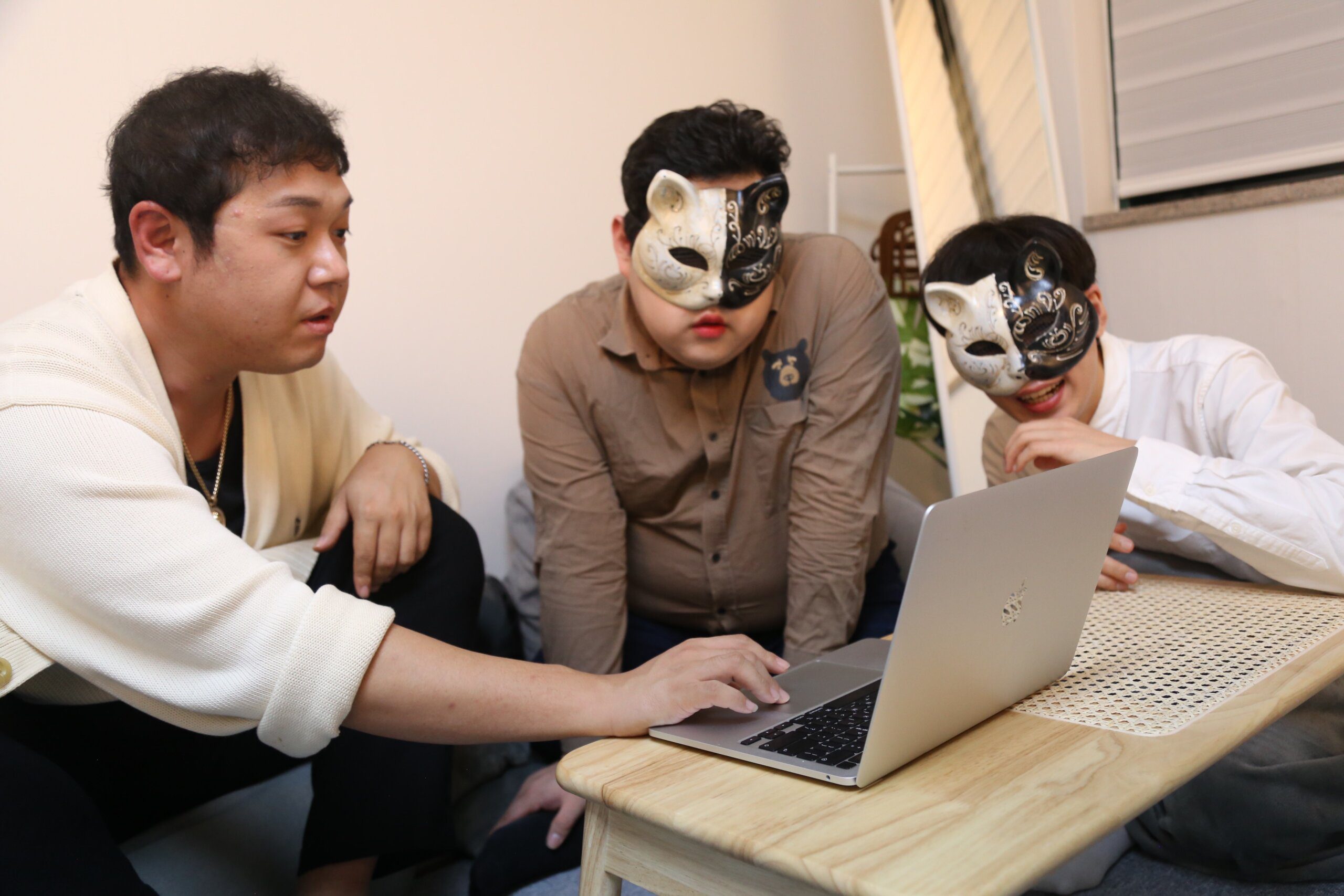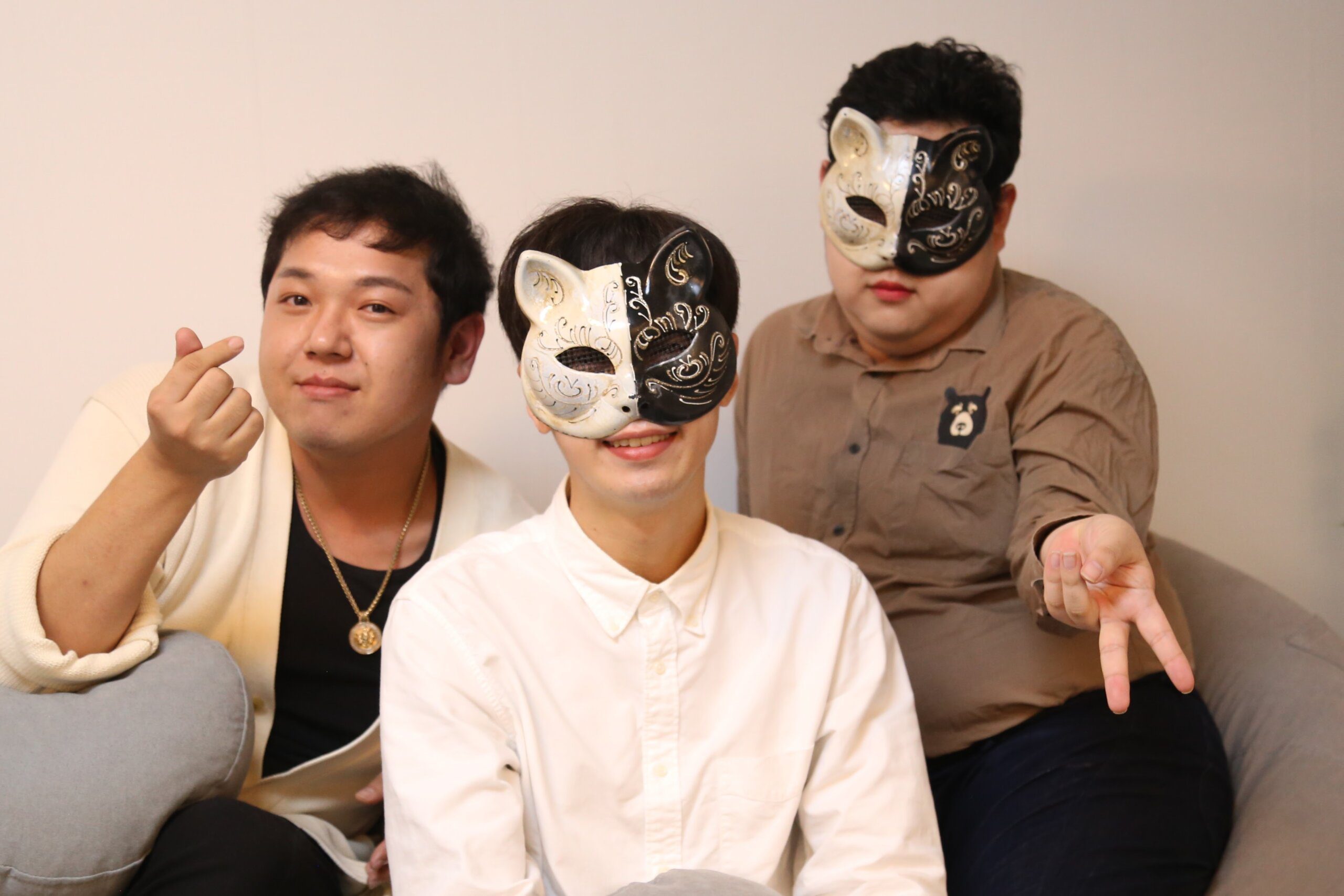South Korean radio station MBC’s broadcast ban of boy band Lionesses’ new song, “It’s OK to Be Me (with Mi-no),” was direct in its reasoning: “homosexuality.” With lyrics like the first verse saying, “The place where finally I live as me, the midnight gay club is my home,” the LGBTQ+ content of the song is undeniable. In the chorus, the band unapologetically declares, “All I know is it’s OK to be me…Ain’t give a sh*t even if you do not understand me at all. I won’t beg to please you.”
Fortunately, the ban was also short-lived, in what might be a sign of incremental change in South Korean media. For Lionesses, the first openly queer boy band in K-pop, it’s a step in their emergence as a new player in the international K-pop sphere.
On Dec. 16, 2022, MBC’s deliberation team notified the band of the decision to ban their song from airing on the network, a public broadcaster and one of the country’s three major radio stations. MBC did offer the band the opportunity to revise and resubmit the song without its gay content.
But as the band noted in an initial public statement, “Lionesses concluded that if the review result of ‘It’s OK to Be Me’ is due to the message of the song or if the reason is [the] singers are gay, unfortunately, we will not be able to produce music that complies with MBC’s review regulations.”
Fans spoke out against the ban, and on Dec. 20, Lionesses shared a second public statement saying that MBC’s Public Media Bureau had apologized and reversed its decision, without any changes being made to the song. Park Gun Sik, director of MBC’s Public Media Bureau, claimed that homosexuality was cited in error.
“In the first place, it was decided that it was impossible to broadcast because it stimulated Christianity, not because of ‘homosexuality,’” Park said. Tapping into the band members’ own Christianity and the notion of Jesus as a champion of those in need, the lyrics include the lines, “I’m a miracle, a.k.a ‘Rainbow After Rain,’ My direct boss in the career of ‘Save the world’ is Jesus,” and “I was designed to be gay from the beginning. My Christ has decided this.”
Nonetheless, the second review deemed the song suitable for broadcast. Meanwhile, “It’s OK to Be Me” has over 15k views on YouTube, the second highest for a Lionesses song.
Lionesses leader Damjun told Xtra that sadly, prior experience had prepared him to handle this situation, since Korean Christian broadcaster CBS had banned the group’s second single, “Christmas Miracle” from their airwaves in December of 2021 due to “singers who violate Christian spirit (LGBTQ team).”
“When I faced this wall of discrimination for the first time last year, [when “Christmas Miracle” was banned] I was so shocked and felt panicked about this. Because I didn’t know what should I do to fight that discrimination,” Damjun says.
“I’ve got so many experiences like this while I work as a known gay singer in Korea. So this time, I know what I have to do when a situation like this happens. I just believe in my beloved fans, and just hope they enjoy and get some power to live from this music.”
Making a name for themselves
For a band that only just celebrated their first anniversary, Lionesses has quickly developed a loyal fanbase. The group calls themselves a boy band and all use he/him pronouns in English, but all members are queer, and member Kanghan is genderfluid. They’ve fought to break out despite no structural support from K-pop’s idol system or major companies, relying on their own background and connections in the music industry.
In K-pop, hopefuls audition for companies and become trainees, taking lessons in everything, from voice and rap to dance and media training, until they are deemed fit to debut as either a solo idol or as part of a group. The “Big 3” companies (YG Entertainment, SM Entertainment and JYP Entertainment) have long track records, big budgets and a stable of existing talent to help their trainees and idol groups on their journey with marketing, primo television appearances and other support. Other companies exist — BTS was put together under the label Big Hit Music (formerly Big Hit Entertainment), essentially a no-name at the time that is now a major player, thanks to the septet’s unique mega-success. But Lionesses have been independent. Damjun translates their lyrics for YouTube to help grow their international fanbase, and he submits their songs to stations himself. The members manage their own social media accounts and reach out to the media directly themselves.
“I collected these guys,” Damjun said in English with a quiet laugh (he also translates for the other group members during a group interview in Seoul).
More than a year ago, Damjun won a grant from South Korea’s Beyond the Rainbow Foundation, an organization that funds LGBTQ+ people in the arts domestically. A vocal coach, freelance producer and composer usually commissioned by independent musicians, Damjun tapped his friend who goes by the stage name Kanghan as the group’s countertenor vocalist. The playful Lee Malrang, a podcaster, joined as another vocalist and maknae, the Korean word for youngest and a noteworthy position in K-pop groups. The fourth (now former) member, known as Foxman, rounded out the group as a rapper. With the grant money, the quartet made what they thought would be a one-off music video for their song “Show Me Your Pride,” and shared it online on Nov. 1, 2021.
According to Malrang, the video’s view numbers were stagnant for the first couple of days, until the South China Morning Post reported on their debut on Nov. 3. That’s when the video blew up, skyrocketing Lionesses to international attention and hitting 90,000 views on YouTube about a month later on Dec. 5. The video now sits at more than 128,000 views, still Lionesses’ biggest hit on that platform or any other.
Over the course of their first year, Lionesses released a series of singles, performed at the Canadian Embassy in Seoul, worked with Amnesty International Korea to help send a positive message to LGBTQ+ teens for the International Day Against Homophobia, Biphobia, Interphobia and Transphobia, and are now gearing up to release their next several singles this year.
Damjun says he wrote the bold and unapologetic dance track “It’s OK to Be Me”—which references Madonna, Mariah Carey, Lady Gaga’s “Born This Way” and BTS’s “Butter,” for those “who need someone to say to them ‘It’s OK to be Yourself.’”
Lionesses aren’t the only LGBTQ+ act in Korean popular music, or the first — inspired by the transgender solo singer Harisu, a girl group called Lady, composed of all transgender women, was active from 2005 to 2007. More musicians like independent singer Holland and Korean-American singer MRSHLL are out and still active. But it’s still a very small club.
Currently, LGBTQ+ people in South Korea have few legal protections, and there is no anti-discrimination law in the country. That’s why it’s so important to Damjun to have LGBTQ+ anthems in Korean, written by Koreans. “I’ve always been waiting for that time to have our songs like that. Of course singers like Lady Gaga or Christina Aguilera made those songs for us in English and we grew up listening to them, but there were no songs in Korean. Nobody made them for us. That’s the reason that I made that.”
The song also features KangHan debuting his drag persona, Rooya, in elegant dresses and fur. Other than regal Rooya, most of the music video’s visuals, such as the makeup, nail polish, leather shorts and sheer tops, while perhaps reading obviously queer in the West, are actually very much in step with current K-pop trends sported by ostensibly cis-het boy bands.
Becoming a trio
Shortly before their one-year anniversary, Foxman left the group when his contract expired. It was a shock to fans, but Lionesses seem to have taken working as a trio in stride.
“Whether we are four or three, the most important thing is we are not alone,” Kanghan says.
Damjun elaborates, “I feel so comfortable communicating musically with this trio. And of course I respect that Foxman wanted to leave this team. I can make enough music for this team with this trio.” In addition to Damjun, Foxman is credited as writing lyrics on two of their songs, “Show Me Your Pride” and “Will You Be My Groom?”

Credit: Delia Harrington
The group hopes to occasionally bring in other artists to feature on their songs, especially other LGBTQ+ artists. (Malrang says Sam Smith and Troye Sivan are dream collabs.) But they’re clear: “We will never add other members.”
While they’ve only released singles so far, the quality of Lionesses songs and music videos has kept them in the conversation in the competitive K-pop industry, where turnover is high, visuals are just as important as the songs themselves, and major companies source the best producers and songwriters from around the world. Lionesses follow-suit, flexing their DIY skills (Kanghan and Damjun made the masks for the “It’s OK to Be Me” video themselves) and the networks they developed in their years in the industry. Working with producer Zantin, an old graduate school classmate who lives in the U.S., Damjun composes, writes lyrics and arranges all of the group’s songs. The band’s music videos are directed by Cho Hanhee, who went to an arts high school with Damjun.
The fans inside the Lionesses DEN
It’s hard to gauge the band’s fame within Korea, even for the members themselves. There is something of a local LGBTQ+ fanbase, but the majority of their fandom, called “DEN,” over 6,000 of them on YouTube, are international K-pop fans.
Damjun thinks they have more fans domestically than the other members realize, something he has a unique perspective on because he’s been recognized on the street.
“I think it’s because I’m the only member who revealed my face,” he says.
Damjun’s referencing the band’s iconic masks, which the other members wear during all music videos, photoshoots and public appearances. In an emotional moment at the end of the “Show Me Your Pride” video, Damjun takes off his mask to reveal his face.
“I wanted our mask[s] to act as a symbol to recognize and protect each other,” Damjun says. He notes that when coming out, the stakes are not the same for all queer people. “We also want to say ‘It’s okay not to come out now, and it’s okay to protect yourself in the closet. It’s not your fault.’”
The others plan to reveal their faces one by one, but it’s something that will happen over time. Damjun, who came out as gay a decade ago, is the only member who is out to his family. His face was also already known in the industry.
“Our families are too conservative,” Malrang says, referencing himself and Kanghan, who both come from Christian families.
“My mother says homosexuality is illegal,” Malrang says. “My mother hates LGBT people … then her tragedy is, her son is homosexual.”
Being openly queer in South Korea comes with very real safety concerns. Earlier this year, one of the country’s only other out queer musicians, Holland, was the victim of a hate crime in the popular nightlife area of Itaewon in Seoul.
“I was angry at first when I heard the news,” Damjun says. “Holland is one of the few gay singers known in Korea… Itaewon is a gay place, where people like Holland and myself should be safe.”
The band is brief, unanimous and blunt when I ask if the situation for queer people in Korea has gotten worse under the current conservative president, Yoon Suk-yeol, who took office in May of 2022. The situation is so bad that the only way for it to get worse, Malrang says, is “we’d be in—” he puts his wrists together in the gesture for handcuffs.
The band is very much aware that they are exactly the kind of role models that they themselves never had growing up.
“There’s only one thing I want to tell the LGBTQ+ teenagers. I don’t want you to get hurt because you realize that you’re LGBTQ,” Kanghan says. “Don’t hurt yourselves.”
Malrang adds his own message for queer teens: “The world can always hate us and things can get worse. But don’t give up.”


 Why you can trust Xtra
Why you can trust Xtra


